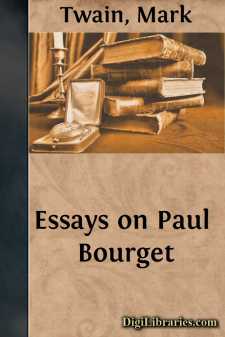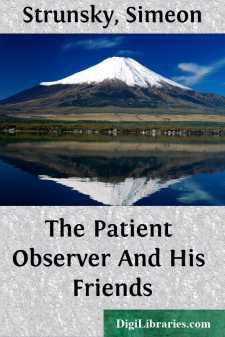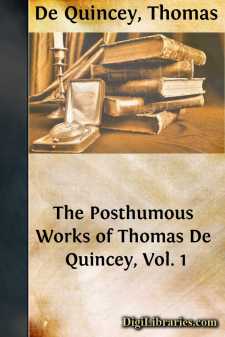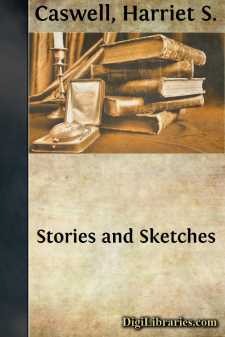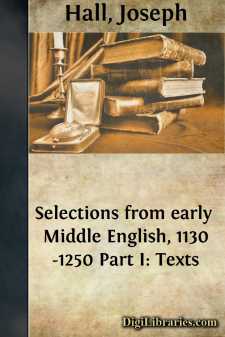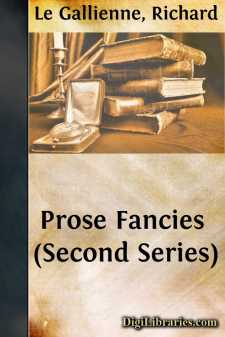Literary Collections
- American 84
- Ancient, Classical & Medieval 14
- Asian 1
- Australian & Oceanian 1
- Canadian 55
- Continental European 121
- English, Irish, Scottish, Welsh 179
- Essays 160
- General 24
- Letters 46
- Middle Eastern 1
Literary Collections Books
Sort by:
by:
Mark Twain
WHAT PAUL BOURGET THINKS OF US He reports the American joke correctly. In Boston they ask, How much does he know? in New York, How much is he worth? in Philadelphia, Who were his parents? And when an alien observer turns his telescope upon us—advertisedly in our own special interest—a natural apprehension moves us to ask, What is the diameter of his reflector? I take a great interest in M....
more...
by:
Simeon Strunsky
COWARDS It was Harrington who brought forward the topic that men take up in their most cheerful moments. I mean, of course, the subject of death. Harrington quoted a great scientist as saying that death is the one great fear that, consciously or not, always hovers over us. But the five men who were at table with Harrington that night immediately and sharply disagreed with him. Harding was the first to...
more...
by:
Francis Bacon
Of Truth WHAT is truth? said jesting Pilate, and would not stay for an answer. Certainly there be, that delight in giddiness, and count it a bondage to fix a belief; affecting free-will in thinking, as well as in acting. And though the sects of philosophers of that kind be gone, yet there remain certain discoursing wits, which are of the same veins, though there be not so much blood in them, as was in...
more...
by:
Walter Pater
[234] IT was on the afternoon of the Feast of Pentecost that news of the death of Charles the Ninth went abroad promptly. To his successor the day became a sweet one, to be noted unmistakably by various pious and other observances; and it was on a Whit-Sunday afternoon that curious Parisians had the opportunity of listening to one who, as if with some intentional new version of the sacred event then...
more...
GENERAL INTRODUCTION. These articles recovered from the MSS. of De Quincey will, the Editor believes, be found of substantive value. In some cases they throw fresh light on his opinions and ways of thinking; in other cases they deal with topics which are not touched at all in his collected works: and certainly, when read alongside the writings with which the public is already familiar, will give...
more...
by:
John Dryden
SCENE.—London. ACT I. SCENE I.—FAILER entering to BURR, who is putting on his buff-coat. Fail. What! not ready yet, man? Burr. You do not consider my voyage from Holland last night. Fail. Pish, a mere ferry; get up, get up: My cousin's maids will come and blanket thee anon; art thou not ashamed to lie a-bed so long? Burr. I may be more ashamed to rise; and so you'll say, dear heart, if...
more...
TERRY DOLAN. ome years since circumstances caused me to spend the summer months in a farming district, a few miles from the village of E., and it was there I met with Terry Dolan. He had a short time previous come over from Ireland, and was engaged as a sort of chore boy by Mr. L., in whose family I resided during my stay in the neighborhood. This Terry was the oddest being with whom I ever chanced to...
more...
by:
Joseph Hall
No description available
by:
Honore de Balzac
THE FIRM OF NUCINGEN You know how slight the partitions are between the private rooms of fashionable restaurants in Paris; Very's largest room, for instance, is cut in two by a removable screen. This Scene is not laid at Very's, but in snug quarters, which for reasons of my own I forbear to specify. We were two, so I will say, like Henri Monnier's Prudhomme, "I should not like to...
more...
A SEVENTH-STORY HEAVEN At one end of the city that I love there is a tall, dingy pile of offices that has evidently seen more prosperous fortunes. It is not the aristocratic end. It is remote from the lordly street of the fine shops of the fair women, where in the summer afternoons the gay bank clerks parade arm-in-arm in the wake of the tempestuous petticoat. It lies aside from the great exchange...
more...


